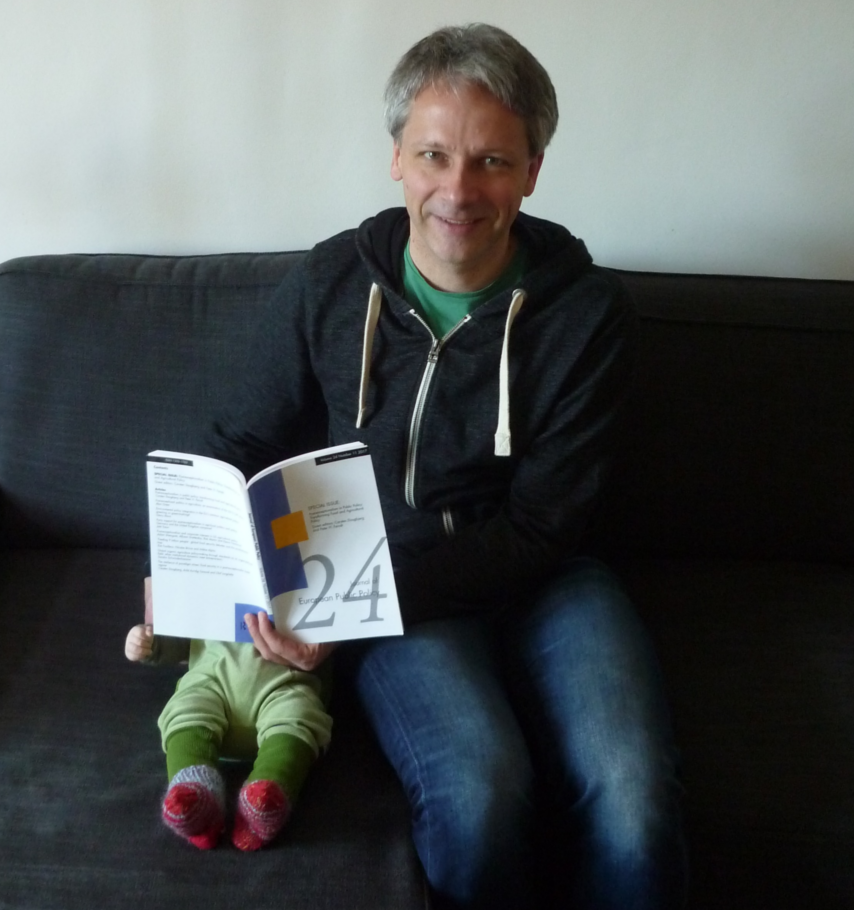Dear friends of JEPP:
2017 was another eventful year for JEPP. We reached new heights, since you decided to feed us with close to 400 submissions, which kept us busy 24-7 (thanks to the time difference between Munich and Christchurch, we are open to business all day). We also received a record number of submissions for our latest special issue call (20!). While we are grateful for having the luxury to pick from such a large number of proposals, it’s not at all fun for us as editors having to turn down so many good proposals. Our biggest wish for 2018 is that you continue to send us your work: original papers, proposals for special issues, research agenda pieces and debate sections. As always, we are committed to processing your work swiftly, professionally, and fairly. And once it is published, we do our best to make sure your work is widely publicized. Looking ahead, 2018 marks JEPP’s 25th anniversary. Maybe Jeremy will share a short story or two on what his expectations were back at the time. Plus, we also promise some interesting features throughout the year, celebrating some of the best contributions to JEPP throughout the past two and a half decades. So, all you need to do is to stay tuned: follow us on Twitter (@jepp_journal), read and subscribe to our newsletter.
Seasons’ greetings and all good wishes,
Your JEPP team
PS: Over the holidays, the JEPP team takes a little break. Here is what we are up to.
 Jeremy: As usual I will be spending Christmas at our holiday house in Akaroa, with Sonia, Tessa, Molly, and our 14-year old dog Harvey. He doesn’t swim but likes to paddle and, like a small child, never wants to stop. Thus, when it is time to come home he digs both paws in the sand and we have to drag him up the beach, all four legs at 45 degrees! The attempt at paddle boarding last Christmas (my idea of a family treat!) was a total disaster as I fell off three times and had to be towed back to the beach, to the great amusement of our neighbours. I think Harvey has the right policy towards water sports but I am determined to take the Kayaks out in the bay. So, if this proves to be as bad a mistake as last year, you will all know where the JEPP co-editor met his end! As you can see from the photo of Akaroa, it is as good a place as any to meet one’s end! For our summer holiday in late January, we all head to Golden Bay for another holiday on the beach. Thus, we have adapted to the Kiwi lifestyle.
Jeremy: As usual I will be spending Christmas at our holiday house in Akaroa, with Sonia, Tessa, Molly, and our 14-year old dog Harvey. He doesn’t swim but likes to paddle and, like a small child, never wants to stop. Thus, when it is time to come home he digs both paws in the sand and we have to drag him up the beach, all four legs at 45 degrees! The attempt at paddle boarding last Christmas (my idea of a family treat!) was a total disaster as I fell off three times and had to be towed back to the beach, to the great amusement of our neighbours. I think Harvey has the right policy towards water sports but I am determined to take the Kayaks out in the bay. So, if this proves to be as bad a mistake as last year, you will all know where the JEPP co-editor met his end! As you can see from the photo of Akaroa, it is as good a place as any to meet one’s end! For our summer holiday in late January, we all head to Golden Bay for another holiday on the beach. Thus, we have adapted to the Kiwi lifestyle.
 Berthold opts for the same procedure as every year and spends the holiday season in Florida with Jessica and his in-laws. He will, first things first, visit his favourite singing Christmas tree in Palm Beach, before immersing himself in the eccentricity of Floridian life (which involves surviving road-trips on the I-95, yoga on the beach, avoiding the area around Mar-a-Lago, and being ripped off in a bar in Miami Beach). Before too long, he will miss his home (and gingery cat) in the country-side in upper Bavaria.
Berthold opts for the same procedure as every year and spends the holiday season in Florida with Jessica and his in-laws. He will, first things first, visit his favourite singing Christmas tree in Palm Beach, before immersing himself in the eccentricity of Floridian life (which involves surviving road-trips on the I-95, yoga on the beach, avoiding the area around Mar-a-Lago, and being ripped off in a bar in Miami Beach). Before too long, he will miss his home (and gingery cat) in the country-side in upper Bavaria.
 Michael is looking forward to many interesting debate and research agenda proposals in 2018 in order to stay up to date about cutting edge research. Apart from research, he has his own new “agenda”: Kolja, 3 months. This year’s Christmas readings will include “Gulliver’s Travels” and “Baby Massage for Dummies”…
Michael is looking forward to many interesting debate and research agenda proposals in 2018 in order to stay up to date about cutting edge research. Apart from research, he has his own new “agenda”: Kolja, 3 months. This year’s Christmas readings will include “Gulliver’s Travels” and “Baby Massage for Dummies”…
 As usual, Philipp will escape London’s hustle and bustle and swap meat pies and stale ale with Mum’s Christmas cookies and Glühwein. There will be lots of time over the holidays to reflect on a great year, and most memorably yet another trip across the globe to visit the rainforests in Brunei.
As usual, Philipp will escape London’s hustle and bustle and swap meat pies and stale ale with Mum’s Christmas cookies and Glühwein. There will be lots of time over the holidays to reflect on a great year, and most memorably yet another trip across the globe to visit the rainforests in Brunei.






 Jeremy: As usual I will be spending Christmas at our holiday house in Akaroa, with Sonia, Tessa, Molly, and our 14-year old dog Harvey. He doesn’t swim but likes to paddle and, like a small child, never wants to stop. Thus, when it is time to come home he digs both paws in the sand and we have to drag him up the beach, all four legs at 45 degrees! The attempt at paddle boarding last Christmas (my idea of a family treat!) was a total disaster as I fell off three times and had to be towed back to the beach, to the great amusement of our neighbours. I think Harvey has the right policy towards water sports but I am determined to take the Kayaks out in the bay. So, if this proves to be as bad a mistake as last year, you will all know where the JEPP co-editor met his end! As you can see from the photo of Akaroa, it is as good a place as any to meet one’s end! For our summer holiday in late January, we all head to Golden Bay for another holiday on the beach. Thus, we have adapted to the Kiwi lifestyle.
Jeremy: As usual I will be spending Christmas at our holiday house in Akaroa, with Sonia, Tessa, Molly, and our 14-year old dog Harvey. He doesn’t swim but likes to paddle and, like a small child, never wants to stop. Thus, when it is time to come home he digs both paws in the sand and we have to drag him up the beach, all four legs at 45 degrees! The attempt at paddle boarding last Christmas (my idea of a family treat!) was a total disaster as I fell off three times and had to be towed back to the beach, to the great amusement of our neighbours. I think Harvey has the right policy towards water sports but I am determined to take the Kayaks out in the bay. So, if this proves to be as bad a mistake as last year, you will all know where the JEPP co-editor met his end! As you can see from the photo of Akaroa, it is as good a place as any to meet one’s end! For our summer holiday in late January, we all head to Golden Bay for another holiday on the beach. Thus, we have adapted to the Kiwi lifestyle. Berthold opts for the same procedure as every year and spends the holiday season in Florida with Jessica and his in-laws. He will, first things first, visit his favourite singing Christmas tree in Palm Beach, before immersing himself in the eccentricity of Floridian life (which involves surviving road-trips on the I-95, yoga on the beach, avoiding the area around Mar-a-Lago, and being ripped off in a bar in Miami Beach). Before too long, he will miss his home (and gingery cat) in the country-side in upper Bavaria.
Berthold opts for the same procedure as every year and spends the holiday season in Florida with Jessica and his in-laws. He will, first things first, visit his favourite singing Christmas tree in Palm Beach, before immersing himself in the eccentricity of Floridian life (which involves surviving road-trips on the I-95, yoga on the beach, avoiding the area around Mar-a-Lago, and being ripped off in a bar in Miami Beach). Before too long, he will miss his home (and gingery cat) in the country-side in upper Bavaria. Michael is looking forward to many interesting debate and research agenda proposals in 2018 in order to stay up to date about cutting edge research. Apart from research, he has his own new “agenda”: Kolja, 3 months. This year’s Christmas readings will include “Gulliver’s Travels” and “Baby Massage for Dummies”…
Michael is looking forward to many interesting debate and research agenda proposals in 2018 in order to stay up to date about cutting edge research. Apart from research, he has his own new “agenda”: Kolja, 3 months. This year’s Christmas readings will include “Gulliver’s Travels” and “Baby Massage for Dummies”… As usual, Philipp will escape London’s hustle and bustle and swap meat pies and stale ale with Mum’s Christmas cookies and Glühwein. There will be lots of time over the holidays to reflect on a great year, and most memorably yet another trip across the globe to visit the rainforests in Brunei.
As usual, Philipp will escape London’s hustle and bustle and swap meat pies and stale ale with Mum’s Christmas cookies and Glühwein. There will be lots of time over the holidays to reflect on a great year, and most memorably yet another trip across the globe to visit the rainforests in Brunei.




